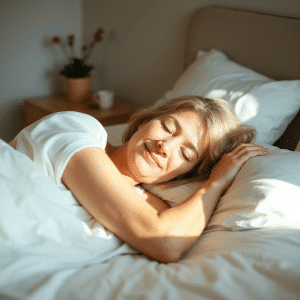
Navigating Sleep During Menopause: Tips for Restful Nights
Sleep is essential for overall well-being, but during menopause, it can often feel elusive. Between hormonal fluctuations, hot flashes, and night sweats, many women find themselves struggling to get a good night's rest. While sleep disturbances are common during menopause, there are strategies you can adopt to improve the quality of your sleep and wake up feeling more refreshed and balanced.
In this blog, we’ll explore the connection between menopause and sleep, the reasons behind sleep disruptions, and natural approaches to reclaiming restful nights.
Why Sleep Becomes a Challenge During Menopause
The onset of menopause brings significant hormonal changes, particularly a decline in estrogen and progesterone. These hormones play a critical role in regulating various bodily functions, including sleep. As their levels fluctuate, women may experience symptoms that directly affect sleep quality, such as:
1. Hot Flashes and Night Sweats: One of the most common symptoms of menopause, hot flashes can wake you up in the middle of the night with sudden intense heat, sweating, and discomfort.
2. Mood Swings and Anxiety: Hormonal shifts can lead to increased anxiety or mood swings, making it harder to relax and fall asleep or stay asleep throughout the night.
3. Insomnia: Difficulty falling asleep, waking up frequently, or experiencing light, restless sleep are all forms of insomnia that can be exacerbated by menopause.
4. Sleep Apnea: Postmenopausal women are at an increased risk for sleep apnea, a condition where breathing temporarily stops during sleep, leading to frequent awakenings and daytime fatigue.
While these symptoms can feel overwhelming, there are ways to manage them and improve your chances of getting a good night’s sleep.
Strategies for Better Sleep During Menopause
The key to improving sleep during menopause lies in a holistic approach that addresses both your body and mind. Here are some practical steps to help you reclaim restful nights:
Create a Cool and Comfortable Sleep Environment. Since hot flashes and night sweats are a primary cause of sleep disturbances, creating a cool sleep environment can make a big difference.
1. Adjust the temperature: Keep your bedroom cool, ideally between 60 and 67°F (15-19°C), to help prevent overheating during the night.
2. Breathable bedding: Opt for lightweight, moisture-wicking sheets and pajamas made from natural fibers like cotton or linen, which can help regulate body temperature and wick away sweat.
3. Fans or cooling pads: Consider using a fan or a cooling mattress pad to maintain a comfortable sleep environment.
Establish a Consistent Sleep Routine. Maintaining a regular sleep schedule can help regulate your body’s internal clock, making it easier to fall asleep and stay asleep.
1. Stick to a schedule: Try to go to bed and wake up at the same time every day, even on weekends, to reinforce your body’s natural sleep rhythm.
2. Create a bedtime routine: Engage in calming activities before bed, such as reading, meditating, or taking a warm bath.
3. Avoid stimulating activities like watching TV or using electronic devices, as the blue light can interfere with melatonin production, the hormone that regulates sleep.
Mind Your Diet and Hydration: What you eat and drink can significantly affect your sleep quality.
1. Avoid heavy meal: Eating large meals, especially close to bedtime, can cause indigestion and disrupt sleep.
2. Limit alcohol consumption: While alcohol might make you feel sleepy initially, it can interfere with deep sleep and increase the likelihood of night sweats.
3. Eliminate caffeine in the afternoon: Caffeine can stay in your system for up to six hours, so try to avoid it in the afternoon and evening to prevent sleep disruptions.
4. Drink plenty of water: Drink water throughout the day to hydrate, but don't drink much right before bed time... you don't want to interrupt sleep to go to the bathroom.
Incorporate Relaxation Techniques: Stress and anxiety can exacerbate sleep problems, so it’s essential to find ways to relax both your body and mind before bed.
1. Deep breathing exercises: Practice slow, deep breathing to calm your nervous system. Techniques like diaphragmatic breathing or the 4-7-8 method can help reduce stress and promote relaxation.
2. Progressive muscle relaxation: This technique involves tensing and relaxing different muscle groups to release physical tension and calm the mind.
3. Meditation or mindfulness: Mindfulness meditation has been shown to improve sleep quality by promoting relaxation and reducing stress. Even a few minutes of quiet reflection before bed can help you unwind.
Consider Natural Sleep Aids: There are natural supplements and herbs that can support better sleep during menopause.
1. Melatonin: This natural hormone helps regulate your sleep-wake cycle. Taking a low-dose melatonin supplement before bed can help you fall asleep more easily.
2. Magnesium: Magnesium promotes relaxation and can ease muscle tension, making it easier to fall asleep. You can take a magnesium supplement or incorporate magnesium-rich foods like nuts, leafy greens, and whole grains into your diet.
3. Herbal remedies: Chamomile tea, valerian root, kava and lavender have long been used to promote relaxation and improve sleep quality.
Before starting any new supplements, it’s always a good idea to consult with a healthcare provider to ensure they’re right for you.
Exercise Regularly: Physical activity can have a positive impact on sleep quality, but timing matters.
1. Moderate exercise: Engage in activities like walking, swimming, or yoga to reduce stress and promote relaxation. Aim for at least 30 minutes of exercise most days of the week.
2. Avoid late-night workouts: Try to finish your workout at least three hours before bedtime, as late-night exercise can sometimes have a stimulating effect and make it harder to fall asleep.
Seek Professional Help When Needed: If sleep problems persist despite trying these natural strategies, it may be time to consult a healthcare professional. Sleep disorders like sleep apnea or chronic insomnia may require medical evaluation and treatment.
Empowering Yourself Through Sleep
The sleep challenges that come with menopause can be frustrating, but they don’t have to control your nights. By making thoughtful lifestyle changes, incorporating relaxation techniques, and exploring natural remedies, you can improve your sleep quality and enjoy more restful nights.
Remember that menopause is a natural transition, and with the right tools, you can empower yourself to manage the changes and feel more balanced. Prioritizing your sleep is one of the best ways to nurture your overall health and well-being during this time.
